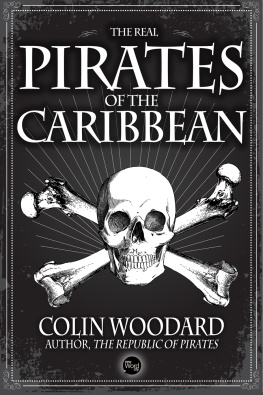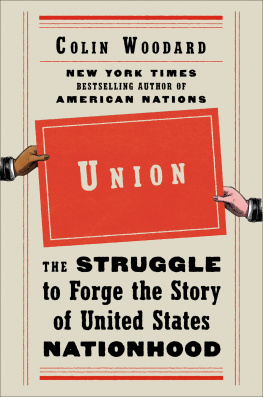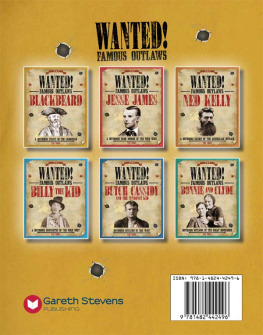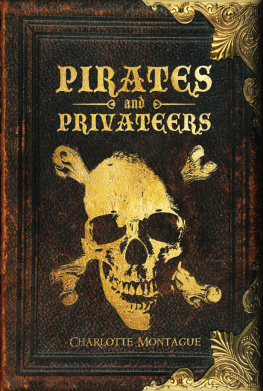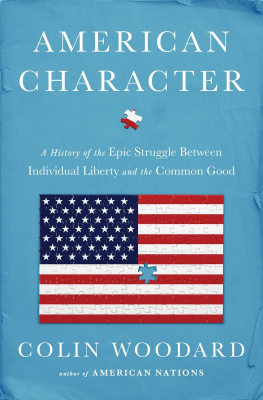Colin Woodard - The Real Pirates of the Caribbean
Here you can read online Colin Woodard - The Real Pirates of the Caribbean full text of the book (entire story) in english for free. Download pdf and epub, get meaning, cover and reviews about this ebook. year: 2014, publisher: New Word City, genre: History. Description of the work, (preface) as well as reviews are available. Best literature library LitArk.com created for fans of good reading and offers a wide selection of genres:
Romance novel
Science fiction
Adventure
Detective
Science
History
Home and family
Prose
Art
Politics
Computer
Non-fiction
Religion
Business
Children
Humor
Choose a favorite category and find really read worthwhile books. Enjoy immersion in the world of imagination, feel the emotions of the characters or learn something new for yourself, make an fascinating discovery.
- Book:The Real Pirates of the Caribbean
- Author:
- Publisher:New Word City
- Genre:
- Year:2014
- Rating:5 / 5
- Favourites:Add to favourites
- Your mark:
- 100
- 1
- 2
- 3
- 4
- 5
The Real Pirates of the Caribbean: summary, description and annotation
We offer to read an annotation, description, summary or preface (depends on what the author of the book "The Real Pirates of the Caribbean" wrote himself). If you haven't found the necessary information about the book — write in the comments, we will try to find it.
Heres the true story of the British Royal Navys struggle with the greatest pirate gang of all time. Drawing on archives in Great Britain and the United States, award-winning journalist and author Colin Woodard separates fact from fiction, revealing the real motivations and struggles of Blackbeard, Black Sam Bellamy, Calico Jack Rackham, and more.
The Real Pirates of the Caribbean — read online for free the complete book (whole text) full work
Below is the text of the book, divided by pages. System saving the place of the last page read, allows you to conveniently read the book "The Real Pirates of the Caribbean" online for free, without having to search again every time where you left off. Put a bookmark, and you can go to the page where you finished reading at any time.
Font size:
Interval:
Bookmark:
Theres no Johnny Depp, mermaids, or zombies here. Just pirates real pirates and the British naval officers who tried to track them down.
The true story of the pirates of the Caribbean the ones who inspired the pirates of fiction from Long John Silver to Jack Sparrow - began in the war-ravaged Bahamas the spring of 1714. The French and Spanish had sacked Nassau four times during the just-ended War of Spanish Succession, which involved most of the European powers. They torched the town, disabled the forts guns, carried away the governor and most of the islands slaves, and drove the rest of the population into the jungle. Now, the governor of Bermuda, Henry Pulleine, warned, the survivors were living without any face of government, every man doing only whats right in his own mind.
Much like their twenty-first century counterparts, the pirates moved into the vacuum, seizing control of this failed state, which, like modern Somalia and Sumatra, set astride a critical bottleneck in world shipping. From this base, the pirates plundered nearby Spanish settlements and merchant vessels and were soon attacking English shipping as well. Until the Bahamas are settled in some form, Pulleine concluded, they will [remain] a nest of pirates.
Indeed, the Bahamas were to become the epicenter of one of the greatest waves of piracy in history: a maritime uprising that would sever Britain, France, the Netherlands, and Spain from their New World empires, cut off trade routes, stifle the flow of goods and information, and threaten the colonies themselves. Although it would last less than a decade, it would come to be known as the Golden Age of Piracy, and its leaders - Blackbeard, Black Sam Bellamy, Stede Bonnet, Calico Jack Rackham, Mary Read, and Anne Bonny among them - would become the stuff of legend. Fortified in the Bahamian base, they would soar to unprecedented heights of both power and popularity, threatening the social and economic underpinnings of King Georges overseas empire.
British military policy not only failed to halt the piracy outbreak, it was one of its primary causes. And as the Bahamian pirate gangs grew in strength, the Royal Navy was impotent to respond, its warships in America and the West Indies being poorly manned, supplied, and maintained. Even after the King made the suppression of piracy a top priority, the worlds most powerful navy remained surprisingly ineffective, the Admiralty being unable to adjust to the subtleties of asymmetric warfare. When the Royal Navy did succeed, it was usually the result of dumb luck or clever alliances with civilian authorities, who had access to the manpower and equipment naval captains lacked. Indeed in the end, the pirates would be defeated not by the warships of the Royal Navy, but by privately financed expeditions, posses, mercenaries and a man named Woodes Rogers.
My own path crossed with that of the Golden Age Pirates more by accident than design. Im a student of history and, while writing a book that explored the peculiar cultural fabric of my native Maine, discovered that the colonial period of American history was nothing like I had been taught in school.
My first impulse toward the pirates was exploitative: I would use their pop culture cache as a vehicle to draw people into the colonial world. I would go into the archives and reconstruct the pirates real story, dispelling the myths and fictions that have long surrounded them. But once I began piecing together the story of the great Bahamanian pirate gang, I realized that it too was far more compelling, relevant, and jaw-dropping than the Disney version. Here, I tell the tale from the perspective of the naval officers whose job it was to defend Britains New World colonies and sea lanes from Blackbeard and his colleagues, often with one or both of their hands tied behind their backs.
Piracy was nothing new in the early eighteenth century: Bandits had been prowling the seas since ancient times, and the late 1600s had seen a sizeable outbreak of English piracy off East Africa. But the Bahamian pirates, most of whom had served in the merchant marine or navy, were different: They didnt see themselves as engaged in simple theft. Rather, most felt they were involved in a social revolt against the ship owners and captains who had so abused them. The pirate Samuel Bellamy, who captured more than 50 ships before his death in a shipwreck off Wellfleet, Massachusetts, at the age of 28, oversaw a crew who referred to themselves as Robin Hoods Men.
In a decidedly authoritarian age, these Caribbean pirates elected their captains and could depose them at any time by a popular vote. They shared their plunder equally, and some bands even provided primitive disability benefits. Paulsgrave Williams gang gave their boatswain a large cache of treasure on account of his being wounded amongst them. Anyone in Bartholomew Roberts crew who became a cripple or lost a limb was given the equivalent of 200 nearly a decades wages for a merchant sailor from the common stock of treasure. On Blackbeards vessels, Africans and Native Americans could serve as equal members of the crew, a policy that drew huge numbers of escaped slaves to their ranks; people of African descent comprised a quarter of a typical pirate crew, and an outright majority on one of Blackbeards ships.
Admiralty policies helped fuel the piracy outbreak. During the war, sailors who managed to survive the brutal discipline, poor food, and unsanitary conditions aboard Her Majestys ships rarely received the wages they were due; as the Admiralty ran out of money, sailors were given tickets IOUs that they were compelled to sell to the loan sharks of the day at a fraction of their face value. After the Peace of Utrecht, the bankrupt Royal Navy rapidly shrunk, shedding three-quarters of its manpower 36,000 sailors in 24 months. Many thousands more seamen were dumped on the wharves of England and the Americas when privateering commissions government papers allowing one to attack enemy shipping in wartime - were withdrawn. With all those sailors desperate for work, merchant captains could slash wages in half; even those lucky enough to get a job had to survive on little more than 1 a month. The waterfronts of naval ports like London and Port Royal, Jamaica, were crowded with huge numbers of aggrieved and impoverished sailors.
Taking advantage of the reduced naval presence, unscrupulous Spanish coast guard vessels based in Cuba began preying on Caribbean shipping, particularly Jamaicas, in late 1713. English merchantmen were searched at gunpoint and declared smugglers if even a single Spanish coin the de facto currency of the British Caribbean were found aboard. Thirty-eight Jamaican merchant vessels were seized in 1713 and 1714, resulting in the incarceration of hundreds of sailors. Those who survived the Cuban prisons found that ship owners would not pay them for the time they were imprisoned, further increasing their discontent. Resentment and the want of employ, one Jamaican resident later recalled, were certainly the motives to a course of life [i.e. piracy]... that most or many of them would not have taken up had they been redressed or could by any lawful means employed themselves.
* * *
The pirate outbreak began humbly enough. In the summer of 1713, Benjamin Hornigold, an ex-privateersman, gathered together a group of 75 fellow sailors and led them from Jamaica to the Bahamas. The archipelago was perfect for piracy: a maze of uncharted islands, reefs, and hidden anchorages perched alongside perhaps the busiest sea lane in the Americas. The square-rigged sailing vessels of the day could make little progress into the wind and so were compelled to follow the prevailing winds as they journeyed from place to place. Any vessel in the western Caribbean that wished to return to Europe or the busy trading ports of North Americas eastern seaboard had no choice but to sail into the Straits of Florida and let the Gulf Stream carry them northwards. It was a dangerous channel: To port lay the forbidding beaches of Spanish Florida, home to hostile Indians, on the starboard, the Bahamas, which had been without a government for a decade.
Next pageFont size:
Interval:
Bookmark:
Similar books «The Real Pirates of the Caribbean»
Look at similar books to The Real Pirates of the Caribbean. We have selected literature similar in name and meaning in the hope of providing readers with more options to find new, interesting, not yet read works.
Discussion, reviews of the book The Real Pirates of the Caribbean and just readers' own opinions. Leave your comments, write what you think about the work, its meaning or the main characters. Specify what exactly you liked and what you didn't like, and why you think so.

